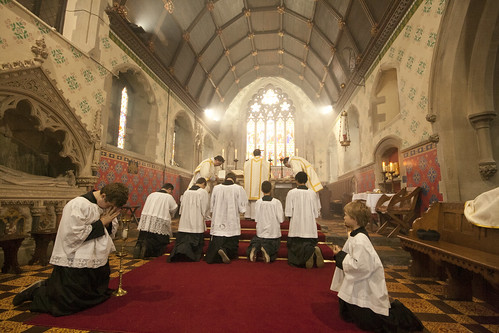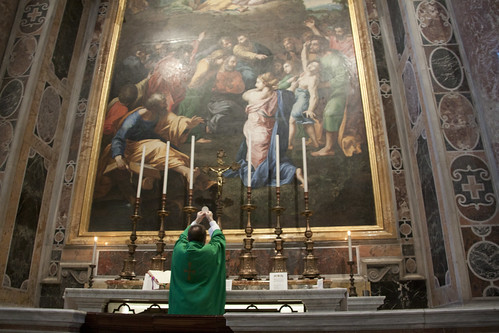In response to my first letter, Loftus wrote (including odd punctuation):
 |
| Servers at Solemn Mass at the SCT Summer School, Pantasaph |
'It is perverse of Dr Shaw to suggest that female altar servers need "serious reasons at the discretion of the bishop and celebrant", The contrary is true - they may only be excluded for such reasons - scandal would be an example.'
Since this is plain enough, and completely false, I thought it best to focus on it for my reply.
Mgr Basil Loftus (Letters, 23rd December) claims that there is a presumption in favour of permitting female altar servers, and they may only be excluded for a good reason. He should read the statements made by successive Prefects of the Congregation of Divine Worship, Cardinals Javierre Ortas and Estévez, in 1994 and 2001 respectively, which make it quite clear that the presumption of the law is against female servers: bishops may permit them; if they do not, they remain forbidden, as indeed they do to this day, for example in the diocese of Lincoln, Nebraska, in the USA.
Both statements underline the point that it 'will always be very appropriate to follow the noble tradition of having boys serve at the altar'; by contrast the justification for permitting female servers must be sought, if anywhere, in 'specific local reasons' (1994) or 'pastoral advantage in the local pastoral situation' (2001).
 |
| Low Mass in St Peter's, sadly without a server: things aren't as well organised as they should be. |
Mgr Loftus may have his own interpretation of Canon Law, but it is the Congregation for Divine Worship, not Mgr Loftus, which has 'the mandate received from the Supreme Pontiff to provide directives to illustrate what is laid down in Canon 230 #2 of the Code of Canon Law and its authentic interpretation', in the words of Cardinal Javierre Ortas. Mgr Loftus can think what he likes, but these directives are binding.
In his long response, Loftus denies that he said what I said he said. This being so, you'd think he'd not need to spend so long disagreeing with me... However he is clearly still fond of the idea that altar females should be allowed absent some special justification, and comes up with two bizarre arguments to help him.
The answer is: any dioceses or individual parishes who do not want altar girls have continued to be free not to have them. If there was an established interpretation of the law which showed that girls could be excluded only for special reasons, the young ladies of the diocese of Lincoln, Nebraska, would long ago have taken their bishop to book. The same goes for the many parishes, in England for example all the Oratories, which have never had altar girls, or have stopped having them. No one has a case against them, because they are allowed to do what they do by these directives of the CDW.
Mgr Basil Loftus has created a sort of parallel universe for himself, in which his favourite bits of Vatican II, Canon Law, and odd snatches of other documents assume a distorted meaning and inflated importance, and everything else, however authoritative, is obliged to fit in with them. The real world is rather different. The dangerous thing about people like Loftus is that he can give less literate liberals pompous justifications for their views. To most people, however, who are aware of his existence, he appears as a national joke.
If you do a Google search for 'Basil Loftus', the top seven hits are Catholic critiques of him, from seven different sources. I've heard that the trads have the upper hand on the net, but this is extraordinary, particularly as the The Catholic Times has no internet presence - zilch - and it is impossible to read his Times articles online or link to them.
But actually the weirdest thing about Mgr Loftus is the little-known fact that his late father was a member of the Latin Mass Society. Family reunions must have been interesting.
No comments:
Post a Comment